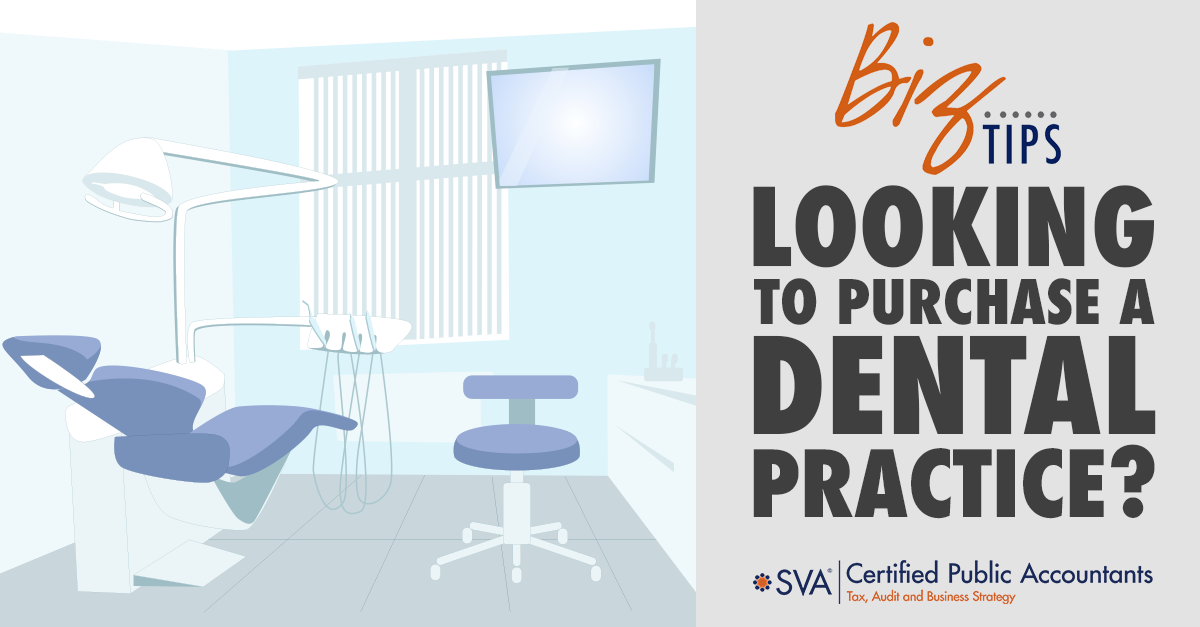| Highlights: |
- Outlines the full process for buying a dental practice, from assessing readiness and finding candidates to valuation, negotiation, due diligence, and closing.
- Explains how practice value is determined, key purchase considerations like valuation methods and tax implications, and why asset purchases are usually preferable to stock sales.
- Emphasizes the importance of professional support—attorney, CPA, and experienced lender—to navigate financial, legal, and transition issues for a successful acquisition.
|
When you decide to buy a dental practice, you're not just purchasing property; you're adopting the staff, the client base, and a reputation in the community. It’s an exciting time in your career.
Start the process early, as there are many considerations to ensure you achieve your financial goals and objectives.
Are You Ready to Purchase a Practice?
Are you a few years out of dental school and working in a practice? Are you gaining valuable experience, building your skill set and patient base, and earning money to provide for a good life and pay back your student loans?
National statistics indicate that the average dental practice has a profit of 40% of its revenue. Are you also wondering if you are doing that well as an associate and contemplating buying a dental practice?
To make an informed decision, you should evaluate if you are operating at full efficiency from the clinical and productivity perspectives. Are you ready to take on the management responsibilities associated with being your own boss and owning your own clinic? Are you ready for the financial risk?
Steps in Buying a Dental Practice
Once you have determined you are indeed ready to purchase your own practice, here are the steps to take you on that journey.
Identify Practices for Sale
Make sure you evaluate several before finding the one you think is the right fit. When you find a practice you're interested in, you'll sign a confidentiality agreement before the seller will share any information with you. Then when you are confident in your selection, you'll sign a letter of intent stating your desire to purchase the practice.
Value of Practice
It is the seller’s responsibility to place a value on the practice, which will be listed as a specific dollar amount or a value range.
Negotiations
This is so much more than just negotiating on price. Further considerations are allocations for tax purposes, payment terms, timing of the transition, whether you employ the retiring dentist, etc.
Due Diligence
This step in the process is the sharing and review of information to provide you with the necessary details to decide whether this is the practice you want to buy and whether the price is appropriate.
Closing
When the agreements are done and signed, the practice transition closes and you can take over.
(Download Video Transcript)
Valuing a Dental Practice for Purchase
Understanding how a dental practice is valued is pivotal in the acquisition process.Whether the practice is valued as a whole or by its components, this stage is crucial for both buyer and seller to agree on a fair price.
At a high level, there are two ways to do this:
- Valued as a Whole – The price of the practice can be set based on a percentage of the top-line collections. For example, a $1 million grossing practice may sell for 70% of collections or $700,000.
- Valued by its Parts – Price can also be calculated by totaling the value of the various components of the practice (i.e., accounts receivable, supplies inventory, equipment, goodwill, etc.).
Regardless of the way it is priced, both the buyer and seller must come to an agreement before this transition can happen.
There are various factors that will impact the price you negotiate when you go to purchase the practice. Some of these factors include:
- Physical location of the practice
- Favorable long-term lease and/or option to buy real estate
- Physical condition of equipment and facility
- Doctor production and hygiene production ratios
- Current fee schedule
- Can the buyer perform all of the services currently provided, or more?
- Payor mix – HMOs, PPOs, Medical Assistance
BUYER BEWARE! Buying Corporate Stock
Now that you and the seller have agreed to a price, what if the seller wants to structure the transaction as a sale of the corporate stock? The recommendation is to not proceed with the transaction, and here’s why:
- If you purchase all the common stock of the practice, you don't receive any tax deduction for the purchase price you're paying now. You will get a deduction sometime in the future when you sell the stock. Ultimately, this raises the acquisition price by as much as 40%.
- If you buy corporate stock to purchase your new dental practice, you are liable for any past issues that occurred such as malpractice suits, wrongful termination of employees, sexual harassment suits, tax audits, or unpaid liabilities. These are now your problems as the new owner.
As the buyer, you want to look at only doing an asset purchase of the practice. If the seller chooses to only proceed with the transaction as a stock sale, then you will want to strongly consider walking away from the sale and finding another practice that will be a better fit.
Tax Considerations
When purchasing a dental practice, there are tax considerations to take into account with regards to the allocation of the purchase price. The allocation of the purchase price is what will drive the tax impact of the deal and how you will pay those taxes as the new owner of the practice for the first few years. It will establish when you can deduct the purchase price, drive the tax cost of the purchase, and ultimately determine the cash flow from the practice.
Buyers and sellers have very different goals when allocating the purchase price to different assets. The reason behind this is that they have different tax treatments depending on what kind of asset it is and how it gets allocated. Here are some examples:
| |
Buyer's Tax Position |
Seller's Tax Position |
| Accounts Receivable |
Immediate Write-Off
|
Ordinary Income
|
| Supplies |
Immediate Write-Off
|
Ordinary Income
|
| Equipment |
3, 5, 7-Year Depreciation
|
Ord+inary Income
|
| Goodwill |
15-Year Amortization
|
Long-Term Capital Gain
|
| Consulting Agreement |
Immediate Write-Off
|
Ordinary Income
|
From a buyer's perspective, you want to allocate more to accounts receivable and supplies to receive the immediate write-off to free up cash flow in the practice.
From a seller’s perspective, they would prefer not to allocate towards assets that are treated as ordinary income because they will pay income tax at the highest rate on their return. For every dollar they can allocate towards goodwill, it will be taxed as a long-term capital gain which is a much better tax rate.
As the buyer, it’s imperative you understand how the negotiated goodwill amount affects your clinic cash flow and the timing of the tax deductions. You will be spending cash to pay back your purchase loans at a faster rate than you can take the tax deductions for the goodwill. Work with your advisors to help find the sweet spot where both the buyer and seller are in happy agreement.
Payment Terms
Most sellers are going to expect cash at closing so you will need to have your bank financing ready to go. Practice purchase loans are often structured as a 7-year or 10-year term loan. Also consider a working capital line of credit to help provide money for the business as you get it up and running. It can act as a safety net in case cash is ever tight or if you need to buy equipment down the road.
There are many lenders who are known for financing dental practices and you as a buyer will find it helpful to work with a bank that has that expertise. Loan packages and interest rates can vary by bank so get a few financing quotes and check your options.
Due Diligence for Buyer
Due diligence is the time to dive deep into the information of the practice so you can give it a full evaluation on whether or not it’s the practice you want to buy. Typical information requests to the seller include:
- Practice financial statements and tax returns for at least three years
- Insurance contracts and reimbursement rates
- Lease agreements including length of leases and rates
- Patient Information
- Chart review to evaluate dentistry services provided
- Employee files
Post-ownership agreements also need to be reviewed. These include:
| Employment Agreement |
If you are going to employ the selling dentist beyond the transition date, what does that employment agreement look like? |
| Covenant Not To Compete |
This will prohibit the selling dentist from opening a new practice in your area for a certain time frame. |
| Consulting Agreement |
If the selling dentist agrees to give you some advice from time to time, a consulting agreement may be necessary. |
Your Team
For your dental practice purchase to be successful, you need an experienced team on your side.
| Attorney |
An attorney who has experience working through dental transitions can draft the necessary documents. |
| Accountant/CPA |
A CPA with dental expertise can provide valuable advice every step of the way. |
| Lender |
Choose a bank that has previously worked with dental practice transitions. |
SVA Certified Public Accountants’ team members have in-depth knowledge of the dental industry that only comes with years of experience working with practices like yours.
We can help with every life stage of your practice – from start-up, through the growth phase, and eventually when you transition out of the practice. Contact us today. We are here to help.
© 2022 SVA Certified Public Accountants

